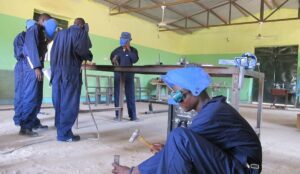ECOWAS vs Niger Republic: Is peace the opposite of war? Part II
By Dr Jimoh Ibrahim CFR
The events we saw from the first, second and ongoing Cold War suggest that war is ingrained in all of us, yes, there may be no scientific proof or empirical evidence, but it is not the case that when science speaks, the truth comes out! One scientific theory, after clinical trials and proof of evidence, which suggests that all swans are black, is no longer valid. At least there are now brown swans found in Igbotako, Ondo state! It is not the case that War is new to any continent or the entire human generation in the geocentric system.
Still, it confirmed that those born after 1967 (the Biafra War) have never experienced war and have been taking caution in the narrative left for them by their parents. Yes, more stories of war every day and Fresh narratives of human insecurity also come from the Manchuria crisis (1931) and the Abyssinia crisis (1935) case of Iraq’s (1991) intervention for national security: the cases of Bosnia (1995) and Afghanistan’s (2001) intervention for human security: the case of Kosovo (1995) intervention after R2P: the case of Darfur (2008). Again, the case of Russia in Ukraine. If we are looking for peace in those countries, it is also the case that those wars have not led to peace, and if we are to end the war in those countries, it is not the case that absolute peace has now returned! That may be why war is an unavoidable part of human existence.
A Harvard psychologist Stephen Pinker saw not too clear a picture when he said, “If the idea that war is part of human nature is not scientifically supported, alternative futures open. If more people work for prevention, the eventual eradication of war is a definite theoretical possibility.” What is impossible is that those who want peace think they do not need war! Those who think we can stay in a world full of peace for as long as we keep praying, the good lord will grant us that much desire for peace is not only psychologically playing, for at least they are theorising!
It will certainly not be possible to prevent ECOWAS from military action in Niger Republic because war is ingrained in everyone, and most soldiers and officers recruited for the military actions were born post-1967! The desire and expectations are high let’s not argue the political celebration of winning for now. Still, at least in the classical days, hegemonic leaders who fought and won wars were celebrated, and it is not the case that these feelings have left us.
ECOWAS may create peace in Niger Republic starting with War, but perhaps not in the short run. It could be argued that never again will there be a Military overthrown of a democratically elected government, at least in the eye of the democrats, if the military action succeeds. But is ECOWAS going to the Niger Republic to fight a war? We are asking because of democratic peace theory (apologies to Immanuel Kent). Liberals and Republicans will not go to war with another liberal. They will hesitate to engage in Armed conflict. It could also be the case that democratic peace theory dies with Immanuel Kent!
To ECOWAS, whatever the pains of intervention, the need for community alliance is imperative to human security, and the military junta cannot provide that much top level of security in the value stick of the apparatus of Government in the Niger Republic in contemporary times. States are considered most secure when war is unthinkable between them. Interestingly, the term unthinkable appears in policy discourse with nearly the opposite meaning, referring to wars that are eminently possible but horrifying to contemplate, such as war with a nuclear Iran. I only hope there is no nuclear weapon coming from anywhere in this community affairs, or is Russia holding meetings? For ECOWAS, it is a matter of “we-feeling” on the part of the participating countries or an imperativeness for security alliance! ECOWAS is addressing dependable expectations of peaceful change!
Those who do not support the military action argued that intervention violates Article 2 (4) non-use of force and, more specifically, Article 2 (7) of the UN constitution for non-intervention in the internal affairs of another country to which all ECOWAS countries are members. The challenge here is to ask whether the UN security council, by Article 51, have not transferred her power to ECOWAS concerning regional peace to ‘prevent and punish’ where there is genocide and breach of international peace. The question to ECOWAS is, do we have such in Niger Republic? ECOWAS will breach those chapters as the US did in Iraq! Again, one may ask the UN what became of resolution ES 11/4 concerning Ukraine, passed in March 2022 and adopted on 7th April 2022, with overwhelming votes of 143 in favour and five against 35 abstaining, demanding that Russia withdraw its forces from Ukraine. The intention is to give way to resolving emerging crises. The resolution demanded “immediately, completely and unconditionally withdraw” The council considered the invasion a violation of Ukraine’s territorial integrity and sovereignty. The question remains “Is the Niger Republic a sovereign State such that military action is made impossible?
Is sovereignty not hypocrisy? Apology to Steven Krasner. See part three of this article. If you miss any part, send an email requesting the missing part to my University of Cambridge life email address [email protected]
Jimoh Ibrahim holds BSc (with Honours) in International Relations from the London School of Economics LSE, the University of London. He holds other University degrees from the University of Cambridge, Oxford, Harvard, and Ife, including two PhDs. He is currently at the 10th National Assembly of the Federal Republic of Nigeria as a Senator representing Ondo South senatorial district.




